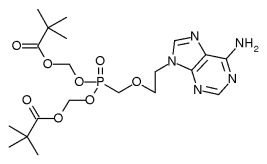* Eplerenone. The U.S. Food and Drug Administration (FDA) has approved eplerenone (Inspra) for the treatment of high blood pressure.
Eplerenone works by selectively blocking aldosterone receptors. Clinical studies suggest that aldosterone contributes to the development and progression of hypertension. Eplerenone can be administered separately or in combination with other antihypertensive therapies.
Side effects include dizziness, fatigue, influenza-like symptoms, diarrhea, and cough. Eplerenone is contraindicated in persons with significant elevations of potassium, renal insufficiency, or diabetes associated with microalbuminuria, or who are taking potassium supplements or certain diuretics.
* Adefovir dipivoxil. The FDA has approved adefovir dipivoxil (Hepsera) for the treatment of chronic hepatitis B in adults with evidence of active viral replication and evidence of persistent elevations in serum aminotransferases (ALT or AST) levels or histologically active disease.
Adefovir is a nucleotide analog agent that blocks the replication of the hepatitis B virus in the body.
Common side effects include asthenia (weakness), headache, abdominal pain, nausea, flatulence, diarrhea, and dyspepsia.
As with other antiviral therapies for chronic hepatitis B, physicians need to monitor liver function for exacerbation of hepatitis following discontinuation of therapy.
COPYRIGHT 2003 American Academy of Family Physicians
COPYRIGHT 2003 Gale Group



